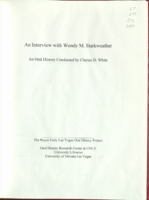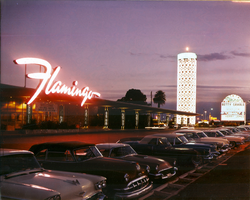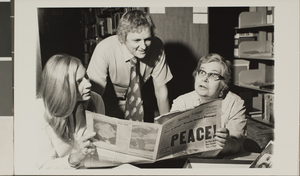Search the Special Collections and Archives Portal
Search Results

Patricia Vazquez interview, November 14, 2018, June 14, 2019: transcript
Date
Archival Collection
Description
Session 1: Interviewed by Marcela Rodriguez-Campo. Barbara Tabach also participates in the questioning. Session 2: Interviewed by Rodrigo Vazquez. Monserrath Hernandez also participates in the questioning. Patricia Vazquez was born and raised in Las Vegas, NV and shares her experiences growing up in the Valley as a Queer Latina. At a young age, she remembers traveling back and forth between Mexico and the U.S. to visit family. When she started school she shares how her home language, Spanish, became her family's "secret language" as she began to learn English. During elementary school Patricia was tracked into the special education program, and remove from the mainstream classroom. She would find her love for learning in books and libraries as she taught herself how to read in English. Despite being tracked into less advanced courses, Patricia would end up taking AP/ Honors courses in high school after forging her favorite teachers signature, which changed her educational trajectory. After coming out to her family, Patricia went nearly a decade distanced from her mother and continued her college education at Arizona State University. There, she would complete a bachelors in painting and a masters in comparative literature. Her work with the Chicano Studies program at ASU helped her develop her Chicana identity and begin her involvement in social activism. In Las Vegas, she worked to fight for marriage equality and LGBTQ rights with the American Civil Liberties Union , and later with the Progressive Leadership Alliance of Nevada. She also conducted several lectures for the Latino Youth Leadership Conference on sexuality, gender, and homophobia for over a decade. She has served as an English Professor at the College of Southern Nevada for the last 20 years and is an avid hiker, traveler, and painter.
Text

Transcript of interview with Wendy Starkweather by Claytee White, June 16, 2010
Date
Archival Collection
Description
Wendy Starkweather recalls her move to Las Vegas on a hot summer day in 1978. Her husband, Peter L. Starkweather had accepted a position to teach biology, but nothing had prepaied her for desert weather in July. She was a small town girl, born and raised in rural Ogdensburg, New York. She attended Skidmore College in Saratoga Springs, NY and became a teacher and librarian in New Hampshire Getting a job at UNLV's library took some time, but finally in 1985, she was offered the position of head of references. From that point on, there was only looking forward for Wendy. She was to be an active member of the library staff until her retirement in 2010. During her over two decades at UNLV she worked under the leadership of six deans. She was an vigorous voice in the development of services, impacting circulation, interlibrary loans and non-book services that included media and instruction. In addition, she was here during a momentous period as the future Lied Library was being fu
Text

Interview with Edward Bonfoy Giller, April 19, 2006
Date
Archival Collection
Description
Text

Interview with Elsie Lavonne Lewis, November 16, 2004
Date
Archival Collection
Description
Text

Photograph of the Flamingo Hotel at sunset, Las Vegas, circa mid 1950s
Date
Archival Collection
Description
Image

Photograph of individuals at Special Collections, University of Nevada, Las Vegas, September 1975
Date
Archival Collection
Description
From left to right: Susan Jarvis, Hal Erickson, and Alfreda Blood in the Special Collections department at the University of Nevada, Las Vegas (UNLV). They are examining the Leonard T. Blood papers just donated to UNLV Special Collections.
Image
Paul J. Richert Photograph Collection
Identifier
Abstract
The Paul J. Richert Photograph Collection (approximately 1950-1951) consists of black-and-white photographic prints and negatives depicting the swimming pools at the Desert Inn and Flamingo Hotel & Casino in Las Vegas, Nevada. Also included is an image of the Las Vegas High School Rhythmettes dance group and an image of the El Rancho Hotel and Casino in Las Vegas.
Archival Collection
Nadine Tobin Collection of Helldorado Photographs
Identifier
Abstract
The Nadine Tobin Collection of Helldorado Photographs, approximately 1940 to 1959, contains black-and-white photographic prints depicting parade floats during Helldorado Days celebrations in Las Vegas, Nevada. Also included is one image of a primary school class in Las Vegas.
Archival Collection
First Good Shepherd Lutheran Church Photograph Collection
Identifier
Abstract
The First Good Shepherd Lutheran Church Photograph Collection, approximately 1930 to 1950, consists of black-and-white photographic prints and negatives depicting the construction of the Good Shepherd Lutheran Church in Las Vegas, Nevada. Also included are images of parish leaders and the ground breaking ceremony for the grand opening.
Archival Collection
Lawrence Revere Papers
Identifier
Abstract
The Lawrence Revere Papers primarily consist of correspondence between Lawrence Revere and the developers of blackjack betting systems dating from 1965 to 1970. The collection includes information about blackjack gambling systems, correspondence with gambling experts, and press material regarding the publication of Revere's book
Archival Collection
